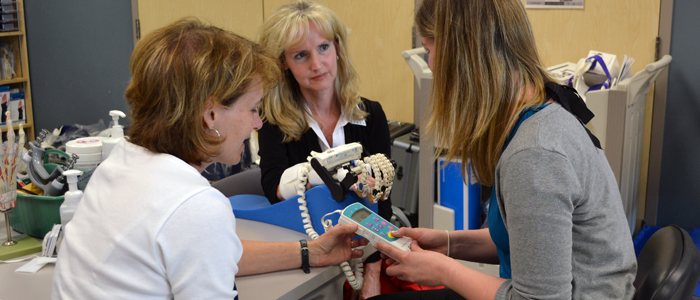


Western's School of Physical Therapy is home to a variety of research labs and facilities that allow students to gain hands-on experience and develop the skill and knowledge necessary to be leaders in the field of therapy and rehabilitation.
This laboratory is equipped with two fully computerized systems for the investigation and evaluation of pulmonary and cardiac function both at rest and in response to physiologic stresses.
The pulmonary system permits pulmonary wellness/disability testing, evaluation of treatment efficacy and both respiratory and metabolic assessment during activity and exercise performance. The cardiac system combines stress testing with additional diagnostic ECG capabilities including the ability to perform signal; -averaged (high resolution) electrocardiography.
A major focus of the laboratory is the use of heart rate variability and spectral analysis for the non-invasive investigation of autonomic nervous system control of the cardiovascular system and cardiac electrical activity in humans. Both the cardiac and pulmonary systems may be programmed to execute custom protocols and as such are versatile enough to handle a diverse subject population, from pediatrics to geriatrics, and the disabled to the elite athlete.
The focus of this research lab is to investigate the changes in mobility performance that occur in older adults under conditions of health and disease to optimize the assessment and rehabilitation interventions for older adults. There are three major areas of interest:
The broad aims of research activities conducted through this facility are:
A variety of neuromotor, fine and gross motor, functional, and anthropometric measurement tools are available to study these special populations.
NOTE: Due to a pending retirement, this lab is no longer accepting graduate students.
An interdisciplinary clinical research lab that is developing valid assessment tools and innovative treatments that will improve the lives of individuals living with chronic, non-healing wounds including pressure ulcers, diabetic foot wounds, and leg ulcers due to lymphedema and peripheral vascular disease. Use innovative strategies to promote practice change and improve health care outcomes and support the emerging role of Physical Therapy on interprofessional wound care teams.
Efficacy of cardiopulmonary physical therapy techniques; optimizing outcomes for hip fracture patients; renal exercise outcomes; head and neck cancer outcomes.
Located in the Fowler Kennedy Sport Medicine Clinic, the lab houses state-of-the-art motion analysis equipment used to assess patients with various musculoskeletal disorders. Co-Directors of this multidisciplinary lab are Trevor Birmingham (Physical Therapy), Robert Giffin (Orthopaedic Surgery), and Thomas Jenkyn (Mechanical Engineering).
Integrated research is about understanding that complex systems are greater than the sum of their parts. Pain and suffering are highly personal experiences that are influenced by biology, psychology and the social context. Members of the 'PIRL' are skilled in exploring the complex interactions between different systems using advanced measurement and statistical modeling techniques. While experimental lab-based techniques are used when needed for foundational work, the focus of PIRL research is on translational clinical research.
Lab website: www.pirlresearch.com
Addresses multiple facets of functional mobility and exercise participation for adults living in long-term care and the community, including: outcome measures, falls, individual experience, embodiment, and behaviour.